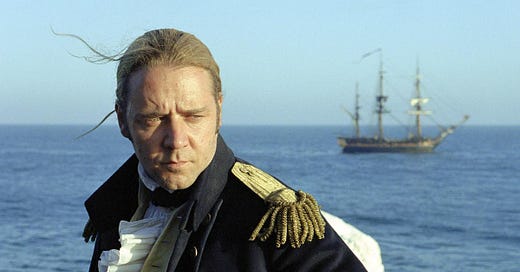The Enthusiast is a reader-supported publication. If you enjoy what you’re reading here, why not subscribe? You’ll enjoy free articles, join a community of defiant praise, and get access to recommendations, playlists, and invigorating chats.
During the summer of 2017, I read all but two of Patrick O’Brian’s twenty-novel Aubrey-Maturin series. I could not stop reading them, and yet in the end I intentionally left them unfinished because I wasn’t sure if I could handle the ache of having no more to read. I began them knowing that they would be good. They came highly recommended by well-read people, some of whom read the series every year. I had also seen the film Master and Commander, named for the first book of the series, and loved it. I still love it, but it is nothing compared to the books.
And nothing could have prepared me for the sheer delight they contained. Twenty books that, in my view, form a single novel much as Proust’s seven volumes form one in À la recherche du temps perdu, is the literary equivalent of a small ocean. Reading them is like sailing with a fair wind, a steady current, and an unbroken daily routine of healthy work and reflection. Most endeavors to write, let alone read, such an output encounter stormy weather, but O’Brian is a master. The pleasures are consistent and consistently ennobling, sobering, joyful and more frequently hilarious than one might expect.
I am writing about them now because after eight years, I have returned to O’Brian and found the series as lovely, if not more so, than when I first read it. The prose remains elegant, its cadences fresh and always sensitive to emotion without caving to sentimentality. The technical knowledge of the British Navy, men of war and the men who crewed them, naval life during the Napoleonic wars and of 19th century medicine, literature, politics, mathematics, science, zoology, and music is astounding yet never obscures the flow of the narrative. The books manage to be exciting and adventurous yet reflective and philosophical without ever losing the reader’s interest.
I suspect this is because, at their heart, they are the long story of a great friendship between the two protagonists. Jack Aubrey and Stephen Maturin are so well developed and so concretely realized that anyone who spends a few pages in their company soon finds that several thousand pages might not be sufficient. For these two have now befriended us and to circumnavigate the world with them and to sink, burn, or take prizes from the French, Spanish, Dutch, and American navies and to thwart their intelligence networks is our chief purpose in life, whatever other nonsense we must endure during our day jobs.
Jack Aubrey is a large, open-handed, guileless English captain, a cunning and fearless strategist at sea but hopeless on land in any domestic matter. Stephen Maturin is a doctor, a naturalist, a Roman Catholic, and a spy. Half Catalan and half Irish and a bastard, his deep love for Jack, his sharp temper, cold-blooded appetite for French destruction, laudanum addiction, complete ignorance of the Royal Navy, passion for nature, and longsuffering love of the beautiful Diana Villiers make him the more complex of the two and the books are told more frequently from his perspective than Jack’s. Nevertheless, for all their differences, their friendship is as rich as any of the baroque duets they play together, Jack on the violin and Stephen on the cello.
This series is altogether praiseworthy and I urge the uninitiated to read it, bearing in mind that while the first volume, Master and Commander, is very good, Post-Captain, its successor, is a near-perfect novel and the quality does not decrease from that point on. I will also say this: eight years ago, I read these books to myself; but now I have them read to me. Patrick Tull is as brilliant and educated a reader as anyone could wish. Blessed with a somewhat gravelly, sea-like voice, his ability to convey the wit, the cadence, the emotion, the accents, and the entire sensibility of the novels is perfect. I have listened to five or so of the books as Tull narrates them, usually while doing the dishes, and sometimes I find myself laughing out loud in my kitchen for pure joy. I cannot think of any better pleasure-reading for the summer.
If you love the Enthusiast, buy us a coffee:
Enthusiastic about what you’re reading here? Leave us a comment and start a good conversation. Further recommendations, random thoughts, and positive diatribes are all welcome.






But will you finish the series this time around?